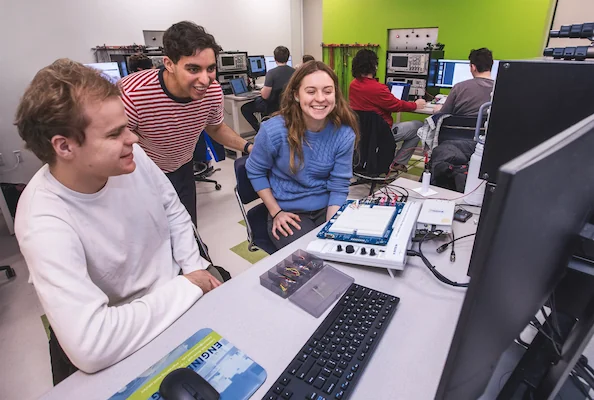It's easy to start your application.
Master's & Certificate Programs

If you have any questions, please contact Jim Feher, Teaching Professor and Director of Master's Programs. You can also reach out to Graduate Student Services for application questions. For all forms and other questions, please go to our Resources for Current & Prospective Students page.
The Electrical & Systems Engineering department offers students the opportunity to pursue master's-level study in a number of areas, as well as a certificate in imaging science.
Students pursuing the degree must complete a minimum of 30 credit hours of study consistent with the residency and other applicable requirements of Washington University in St. Louis and the McKelvey School of Engineering. The degrees may be pursued with a course only or thesis option.
Students will enjoy the benefits of programs that balance fundamental theoretical concepts with modern applications. In our department, students find ample opportunities for close interactions with faculty members working on cutting-edge research and technology development.
- Master of Science in Electrical Engineering
- Master of Science in Systems Science & Mathematics
- Master of Science in Engineering Data Analytics & Statistics
- Master of Science in Computer Engineering
We also offer a Graduate Certificate Programs:
Programs no longer accepting new applications:
- Master of Control Engineering
- Master of Engineering in Robotics
More details can be found in the campus bulletin.
Course option
This option is intended for those employed in local industry who wish to pursue a graduate degree on a part-time basis, or for full-time students who do not seek careers in research. Under the course option, students may not take ESE 5980: Master's Research, and with faculty permission may take up to three units of graduate level Independent Study.
Thesis or Project Option
These options are intended for those pursuing full-time study and engaged in research projects. Candidates for this degree must complete a minimum of 24 units of course instruction and 6 units of either thesis research (ESE 5980) or master's project (ESE 7970); 3 of these units of the thesis or project credit may be applied toward the 15 core electrical engineering units required for the MSEE program. Any of these 6 units may be applied as electives for the MSEE, MSSSM, and MSDAS programs. Students must complete the requirements for either the thesis or project as outlined by the department in the Master's Student Handbook
Core principles common to all degrees
- A maximum of six credits may be transferred from another institution and applied toward the Master's degree.
- ESE 5980: Electrical & Systems Engineering Graduate Seminar must be taken by full-time graduate students each semester. Master's students must attend at least three seminars per semester.
- The degree program must be consistent with the residency and other applicable requirements of Washington University and the McKelvey School of Engineering.
- Students must obtain a cumulative grade point average of at least 3.2 out of a possible 4.0 over all courses applied toward the degree. Courses that apply for the degree must be taken with the "Credit/Letter Grade" option.
Suggested academic requirements for prospective students
-
A baccalaureate degree in engineering or STEM-related degree.
- The following courses which form the foundation for the upper-level courses required for the degree are highly recommended:
- Calculus Sequence and Differential Equations
- Probability and Statistics
- Engineering Mathematics
- Matrix Algebra
- Physics
- Introductory Computer Science
- Signals and Systems
- Circuits/ Electrical Networks
- Knowledge of a scientific or quantitative social science field is encouraged but not necessary for success in the Master of Science in Engineering Data Analytics & Statistics program
- Additional courses for Prospective Electrical Engineering Students
- Introduction to Electronic Circuits
- Introduction to Digital Logic and Computer Design
- Electromagnetics
-
Currently, there is no financial aid available for MS students. Admitted students typically have an average score greater than 90 percent on the quantitative section (new GRE scale) and 3.0 or greater on the analytical section.
-
International students who are required to submit a TOEFL or IELTS score and who have not studied previously for a minimum of three years in a U.S. school will be required to take an Engineering Communication Tools course during their first semester. This course does not count toward degree requirements and does not require any additional tuition; it is graded on a pass/fail basis, so it is not factored into the grade-point average.
-
Undergraduate or postgraduate research experience is highly desirable for admission to the PhD program, but not mandatory for the master's program. Letters of recommendation from research mentors are a particularly important part of the graduate application. Descriptions of previous research experience or future research goals in the personal statement portion of the application are also important in the admissions decision.
Finance & Fellowships
Master’s students are expected to be self-supporting. However, there is a limited list of fellowships, research assistantship opportunities & aid available for full-time master’s students.
- Master's Honors Program: The Master’s Honors Program is intended to recognize the top ESE Master’s students who are also engaging faculty in research. Students accepted into the ESE honors program will have an expedited consideration for admission to ESE Ph.D. programs.
- Department Chair's Master's Fellowship: This fellowship provides master of science degree candidates a financially-supported research position during their master's studies. Students from other engineering fields and STEM disciplines are also encouraged to apply.
- See the Resources for Current & Prospective Students page for more.
